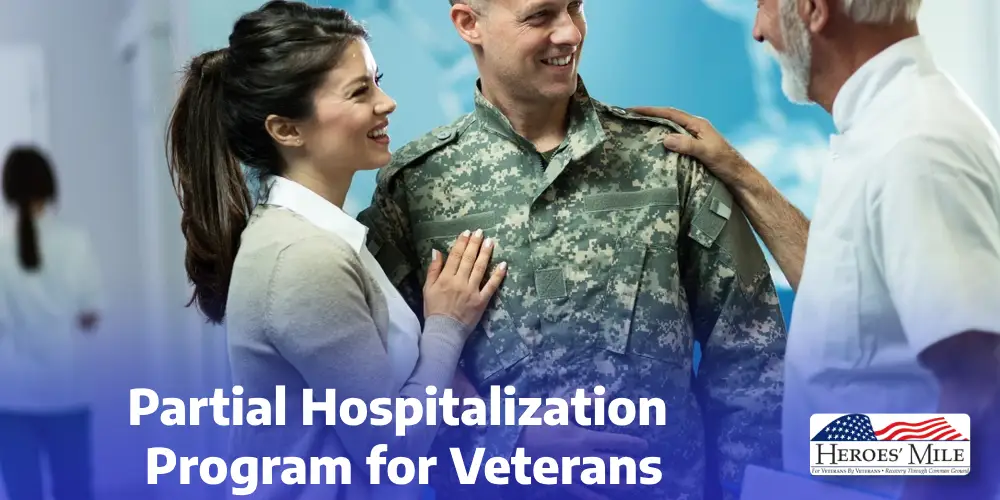Partial Hospitalization Program for Veterans
PHP supports veterans’ sobriety while that provides a structured level of support as the veteran’s transition into a more independent lifestyle.

Discover a Partial Hospitalization Program for Veterans, by Veterans
We help you find recovery through common ground. Our unique approach to care includes comprehensive treatment and individualized treatment planning to ensure that we meet your unique needs. But is PHP right for you?
PHP is for clients who meet one of the following criteria:
- Veterans who have completed the residential addiction treatment program.
- Veterans whose needs do not require residential treatment, but still need a level of support and structure.
Our PHP allows veterans to reintegrate into their lives with needed support. In order to participate in this level of care, clients need to have achieved a degree of stability in their lives.
Heroes’ Mile Partial Hospitalization Program
When a veteran enters our PHP program, they can expect to attend individual therapy sessions, group therapy sessions, and family therapy sessions. Through all treatment modalities, our services are overseen by mental health professionals, addiction recovery experts, and/or physicians to ensure comprehensive care for the military personnel under our care.
Individual Therapy Sessions
Individual counseling sessions provide tailored treatment for every client. As veterans ourselves, we understand addiction issues that are unique to veterans. That’s why we employ evidence-based addiction recovery and mental health treatments like cognitive behavioral therapy.
During these sessions, clients and counselors work closely to develop and adjust treatment goals. This is also a time to cover any issues that have contributed to substance abuse in your life.
Group Therapy Sessions
Group counseling can sound intimidating. Yet, it is important to remember that each person comes into the group with their own fears and insecurities. All participants in group sessions are veterans, which helps to provide common ground to help you relate with others facing addiction and invisible wounds of war.
In addition, our group therapy sessions are confidential and supportive. They are orchestrated by addiction experts and mental health professionals, who guide conversations to help group members develop healthy coping skills. After treatment, clients use these skills in everyday life to keep them from relying on drugs and alcohol.
Family Therapy Sessions
Family therapy sessions are similar to group sessions, but with family members. They help to educate family members about addiction, the impact that it has on families, and how to support their loved one.
We provide veterans and their families with the tools they need to transition into a sober lifestyle. This requires the treatment of the person as a whole and incorporates their support system. By educating family members and helping to heal damaged relationships, we prepare clients for lifelong recovery.
Once a client has completed PHP, they have the option to move into our intensive outpatient program (IOP).
FAQ
- What is a Partial Hospitalization Program (PHP) for veterans?
A PHP is an intensive, structured treatment program designed for veterans who need daily support for mental health or substance use disorders but do not require 24/7 inpatient care. - Who qualifies for the veteran PHP?
Veterans struggling with PTSD, depression, anxiety, substance use, or other behavioral health issues may qualify. A clinical assessment determines eligibility based on individual needs. - What treatments are included in a PHP?
Treatment typically includes individual therapy, group counseling, medication management, trauma-informed care, and holistic therapies tailored to veterans’ unique experiences. - How long does the program last?
The length of stay varies based on individual progress but generally lasts several weeks, with sessions held five days a week for several hours each day. - Does the program provide support for transitioning back to daily life?
Yes, PHPs include aftercare planning, coping strategies, and connections to community resources to ensure a smooth transition back to work, family, and everyday responsibilities.
